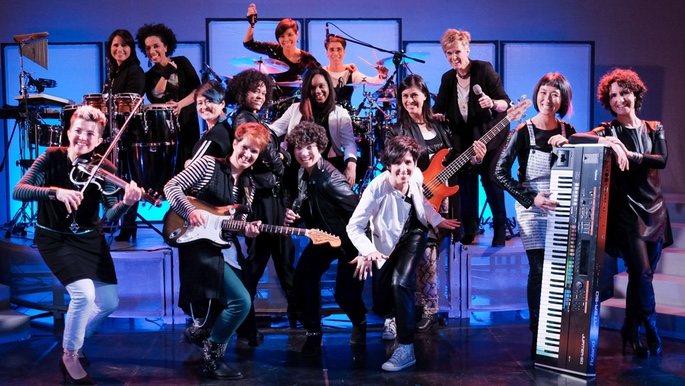
Oct 18, 2018 | Non categorizzato
 Rome: Partecipation in the event “Quando la Carità ti chiama”, (When Charity calls you), promoted by the Vincentian Family as part of the “Finding Vince 400” (FV400), International Film Festival. Auditorium Conciliazione. GenVerde Tours
Rome: Partecipation in the event “Quando la Carità ti chiama”, (When Charity calls you), promoted by the Vincentian Family as part of the “Finding Vince 400” (FV400), International Film Festival. Auditorium Conciliazione. GenVerde Tours
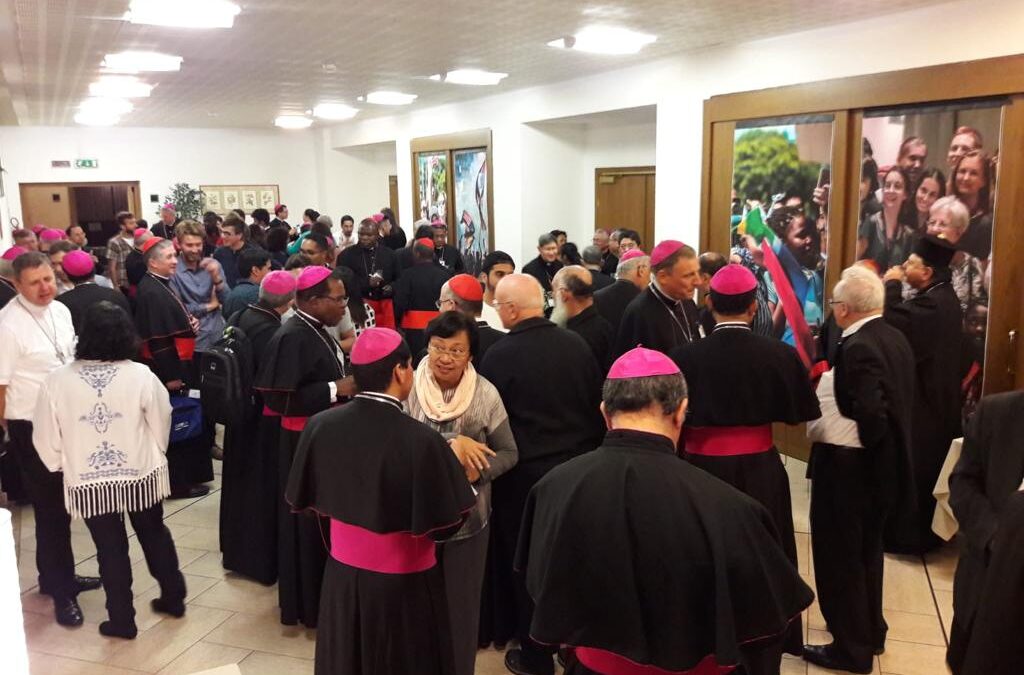
Oct 17, 2018 | Non categorizzato
Conversations in different languages could be heard amid the tastefully and simply set tables. For three evenings, the young people of the Focolare acted as hosts in a hall, close to where the works of the Synod will carry on up to 28 October. After a warm welcome, the three dinners revealed to be the right occasions for the exchange of ideas, informal sharing and mutual interaction. During dessert, there was a presentation of the recent international Genfest held in Manila and some experiences, and stories of commitment and coherence to boost closer contact with the synodal Fathers, in line with a meeting held a day earlier, where they express queries, uncertainties, choices, in the hope that the Synod would propose some answers. In the second soiree, František from Czechia took the floor. His words highlighted a genuine passion for politics and concrete commitment in view of the next European Parliament elections emerged with the request, “Please support me with your prayers, so that I may always be faithful to the choice of serving my people, without any personal interest.” A similar story came from Nicola. She is 33 and a pediatric therapist in a university hospital. “I engage in rare pathologies and pediatric insurgence, and therefore I am always in contact with situations often at the brink of death. The difficulty at times lies in communicating to the relatives, the prognosis and life expectancies of the child. In these moments, I entrust myself to God, so that he may help me find the right words and attitude. Cynical detachment is a due form of survival, but we mustn’t lose the human dimension. Every day for me is like a gym in which to love and serve God.” Then it was Nicola’s turn. “Practicing this profession – he explained – means living at the limit between faith and reason; in these years I have learned what suffering is, and what it means to live immobile on a bed, attached to the mechanical lung for breathing. At times my faith is harshly put to the test, but then I have no time to reflect, being ’forced’ to see to the people I have before me, and loving them. This is really a countenance of Jesus Forsaken. If I manage to welcome him poor and miserable as he is, this fills up the void. I have to face many situations. 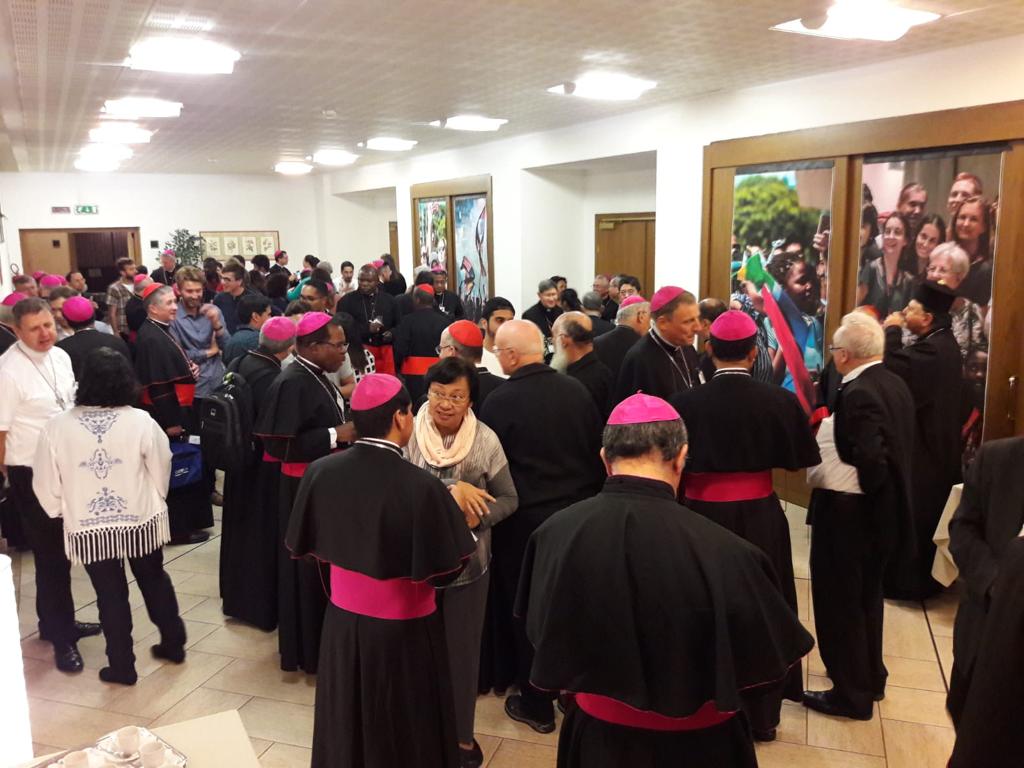 The families of the eastern countries are at times the most desperate since they do not have adequate healthcare systems, both from the economic and clinical standpoints that can help them. This is why they undertake hope journeys to our hospitals in search of treatments, which in some cases imply great expenses, given that these are issued only to Italian citizens. These situations lead us to reflect that at times, being born in one part of the world is just a matter of luck. It is in these cases that God reveals his grandeur and asks you to do the impossible. We certainly must not break the laws but we can try to help in other ways, for example, proposing strategies to limit at best the deformity of the joints, or trying to stand by and be of help.” Time had flown. It seemed like the guests did not wish to leave. The challenge of a deep and reciprocal listening between generations, the reason for the Synod itself, had also taken the form and consistency even in a dinner. And the dinner ended with the words of the song dedicated to Mary, the silent response of utmost love. By Chiara Favotti and Gustavo Clariá
The families of the eastern countries are at times the most desperate since they do not have adequate healthcare systems, both from the economic and clinical standpoints that can help them. This is why they undertake hope journeys to our hospitals in search of treatments, which in some cases imply great expenses, given that these are issued only to Italian citizens. These situations lead us to reflect that at times, being born in one part of the world is just a matter of luck. It is in these cases that God reveals his grandeur and asks you to do the impossible. We certainly must not break the laws but we can try to help in other ways, for example, proposing strategies to limit at best the deformity of the joints, or trying to stand by and be of help.” Time had flown. It seemed like the guests did not wish to leave. The challenge of a deep and reciprocal listening between generations, the reason for the Synod itself, had also taken the form and consistency even in a dinner. And the dinner ended with the words of the song dedicated to Mary, the silent response of utmost love. By Chiara Favotti and Gustavo Clariá
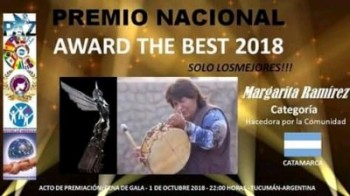
Oct 16, 2018 | Focolare Worldwide
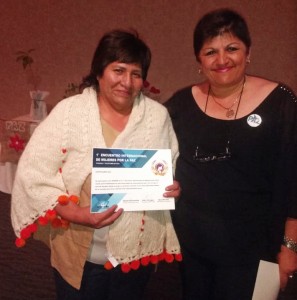 Many of our readers are familiar with the story of Margarita Ramirez De Moreno who comes from Santa Maria di Catamarca in the north east of Argentina. She is a descendent of Calchaquies Aborigines whose leader was Juan Calchaqui. These people were well known for their abilities in many forms of traditional crafts. Margarita certainly inherited an enterprising spirit and great talent in weaving from her ancestors. When she was young, she studied for a diploma at the “Aurora School” in her town: this institute is recognised by the Argentinian government for the outstanding contribution it makes to teaching about designs and traditional skills deriving from the “quechuan” culture. Later on in life, Margarita was unemployed but she did not give in to the personal challenges that she and many women like her faced but decided to open a spinning mill to provide thread for the looms in the school workshop. This enabled her to overcome discrimination and reclaim her cultural identity. On October 1st in Tucuman, Margarita received an award during the first international meeting of “Women for Peace” organised by the “World Federation of Grand Master Ladies”. This is an international association, found in many parts of the world that works with individuals, groups and foundations: its spirit facilitates women in establishing links of friendship, fraternity and support and enables them engage politically in initiatives promoting peace, security and protection.
Many of our readers are familiar with the story of Margarita Ramirez De Moreno who comes from Santa Maria di Catamarca in the north east of Argentina. She is a descendent of Calchaquies Aborigines whose leader was Juan Calchaqui. These people were well known for their abilities in many forms of traditional crafts. Margarita certainly inherited an enterprising spirit and great talent in weaving from her ancestors. When she was young, she studied for a diploma at the “Aurora School” in her town: this institute is recognised by the Argentinian government for the outstanding contribution it makes to teaching about designs and traditional skills deriving from the “quechuan” culture. Later on in life, Margarita was unemployed but she did not give in to the personal challenges that she and many women like her faced but decided to open a spinning mill to provide thread for the looms in the school workshop. This enabled her to overcome discrimination and reclaim her cultural identity. On October 1st in Tucuman, Margarita received an award during the first international meeting of “Women for Peace” organised by the “World Federation of Grand Master Ladies”. This is an international association, found in many parts of the world that works with individuals, groups and foundations: its spirit facilitates women in establishing links of friendship, fraternity and support and enables them engage politically in initiatives promoting peace, security and protection. 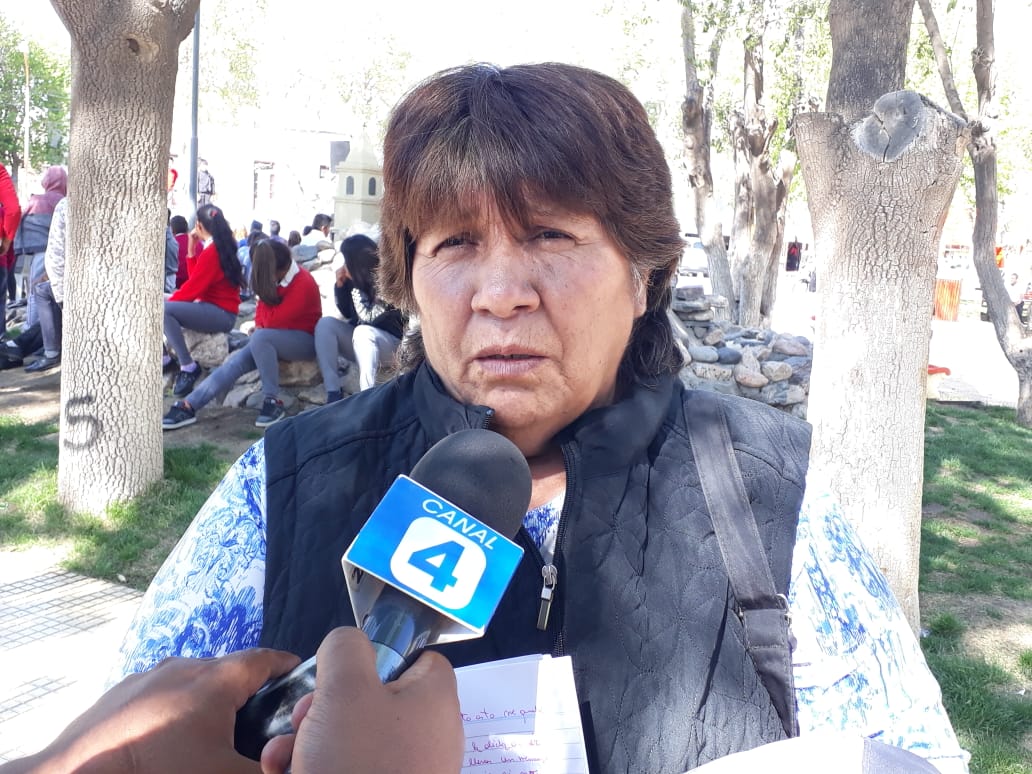 “There is no peace without justice and there is no justice without peace,” affirmed Mariela Martin Domenichelli, the co ordinator of the Latin American branch of the federation. “It’s important to listen to the women describing the situations in which they live so they can transform their ideas into political action that benefits the entire community.” The meeting wanted to showcase the positive contribution made by women in various fields of action. After the federation visited her area, Margarita was chosen as the person who symbolises the complete integration of women and the entire Aboriginal community to which they belong. Margarita – who now has seven children – said that it had not been easy to convince women in her area to work in spinning mills once again because they had suffered discrimination for so long. In addition, they had to walk long distances, crossing rivers to reach the mill because there was no transport. However, they gradually began to share the little they had: a bobbin, some wool or their skills in traditional crafts.
“There is no peace without justice and there is no justice without peace,” affirmed Mariela Martin Domenichelli, the co ordinator of the Latin American branch of the federation. “It’s important to listen to the women describing the situations in which they live so they can transform their ideas into political action that benefits the entire community.” The meeting wanted to showcase the positive contribution made by women in various fields of action. After the federation visited her area, Margarita was chosen as the person who symbolises the complete integration of women and the entire Aboriginal community to which they belong. Margarita – who now has seven children – said that it had not been easy to convince women in her area to work in spinning mills once again because they had suffered discrimination for so long. In addition, they had to walk long distances, crossing rivers to reach the mill because there was no transport. However, they gradually began to share the little they had: a bobbin, some wool or their skills in traditional crafts.  “The cost of machinery was a big problem,” Margarita said. “One day I was getting a lift and I told the driver about the difficulties we had. He told me that he knew how to make spinning machines and that we could pay him later, when we had the money. There were many difficulties but there were also signs that confirmed that what we were doing was right.” Margarita continued, “One day, when we were moving some fittings in the workshop, we found a picture of Mary, the Mother of God. This made a big impact on me and I felt that we should make a pact together to always love one another each day at work. We did this and soon after we received a donation that we used to buy better fittings and machinery.” We named our workshop “Tinku Kamayu” which in the local dialect means “Gathered together to work.” “We have found our identity and with that comes hope, growth, job opportunities for ourselves and others and the richness of our cultural origins. We feel we are useful – we don’t feel humiliated any longer. Other people appreciate us and want to hear our ideas.”
“The cost of machinery was a big problem,” Margarita said. “One day I was getting a lift and I told the driver about the difficulties we had. He told me that he knew how to make spinning machines and that we could pay him later, when we had the money. There were many difficulties but there were also signs that confirmed that what we were doing was right.” Margarita continued, “One day, when we were moving some fittings in the workshop, we found a picture of Mary, the Mother of God. This made a big impact on me and I felt that we should make a pact together to always love one another each day at work. We did this and soon after we received a donation that we used to buy better fittings and machinery.” We named our workshop “Tinku Kamayu” which in the local dialect means “Gathered together to work.” “We have found our identity and with that comes hope, growth, job opportunities for ourselves and others and the richness of our cultural origins. We feel we are useful – we don’t feel humiliated any longer. Other people appreciate us and want to hear our ideas.”
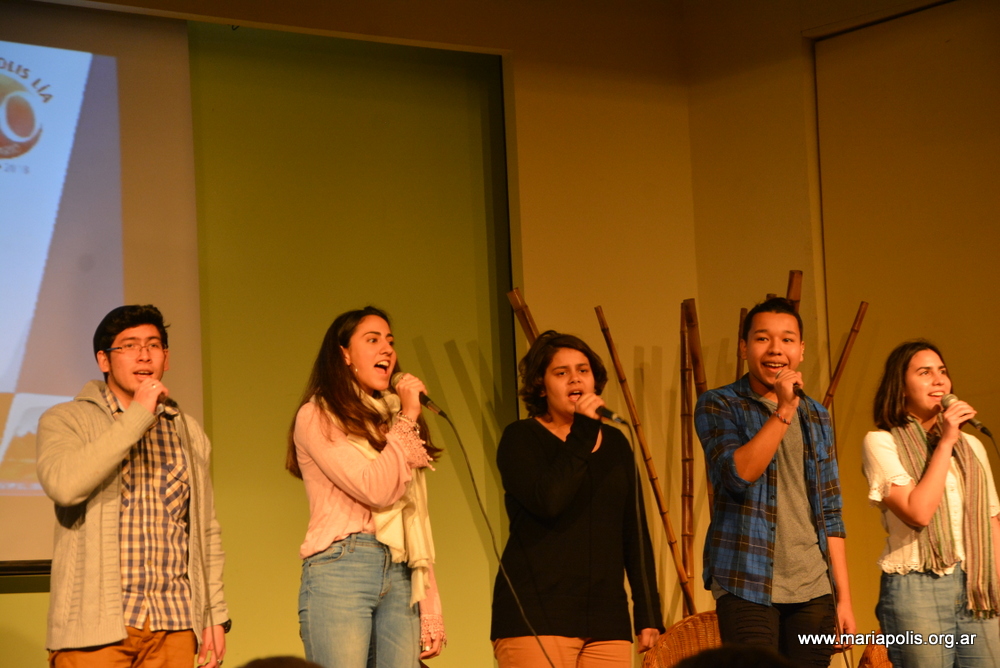
Oct 15, 2018 | Non categorizzato
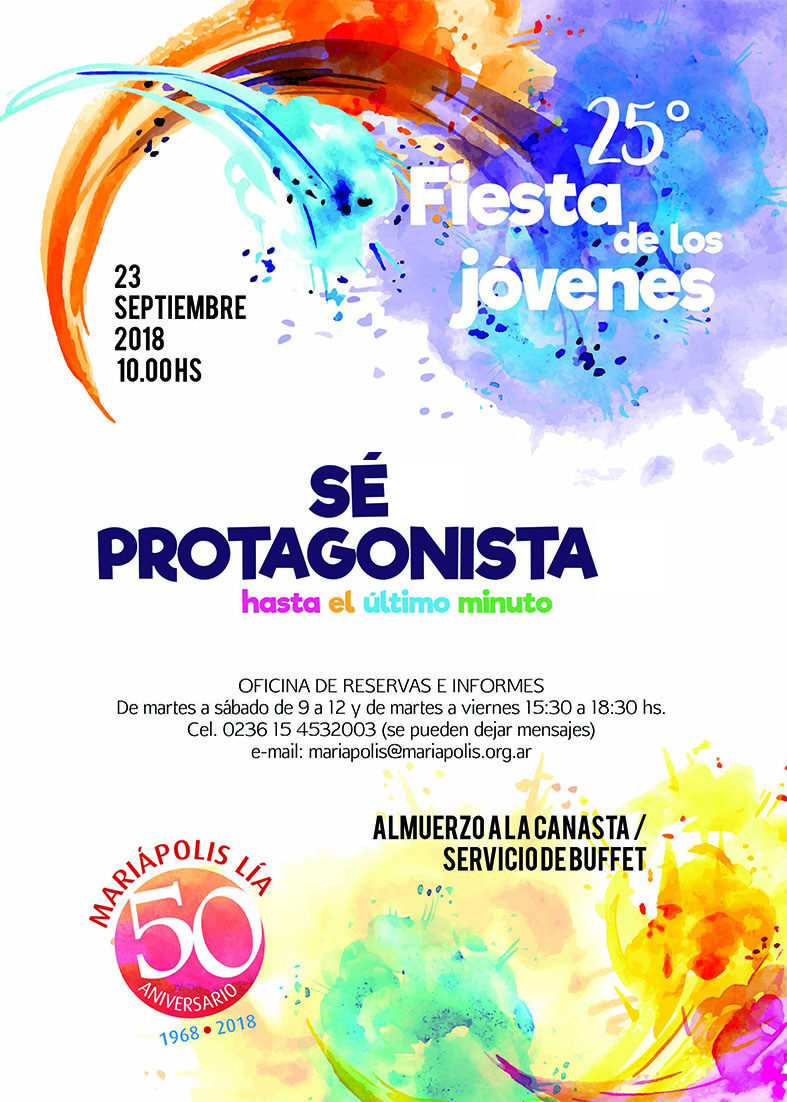 Argentina, Mariapolis Lia. 800 young people learning how to take lead roles, not only in drama but in real life. In the Argentine Pampas, the Focolare town Mariapolis Lia – named after Lia Brunet, a pioneer of the Focolare Movement in South America – is not slowing down after celebrating the 50th anniversary of its foundation in July. It launched an invitation over a spring weekend in September for young people to take the lead in their own lives “right to the last moment”. «This expression – explained a Mariapolis Lia resident – is inspired by Guillermo Curti, a Focolarino priest who died suddenly early in the year and who was for us a model of faithfulness and of love right to his last moment». The weekend of 22nd-23rd September saw the arrival of 800 young people from Paraguay, Uruguay and Argentina. «On the first day, we worked together in groups according to our countries of origin in order to prepare stands across the whole little town which showcased our own cultures and helped us all to get to know each other on a personal level. In the evening we put on a wonderful show of dance and performances reflecting our different folkloristic traditions. All of us young people found ourselves taking the lead in the preparation of the second day, Sunday, when more young people arrived from different regions of Argentina».
Argentina, Mariapolis Lia. 800 young people learning how to take lead roles, not only in drama but in real life. In the Argentine Pampas, the Focolare town Mariapolis Lia – named after Lia Brunet, a pioneer of the Focolare Movement in South America – is not slowing down after celebrating the 50th anniversary of its foundation in July. It launched an invitation over a spring weekend in September for young people to take the lead in their own lives “right to the last moment”. «This expression – explained a Mariapolis Lia resident – is inspired by Guillermo Curti, a Focolarino priest who died suddenly early in the year and who was for us a model of faithfulness and of love right to his last moment». The weekend of 22nd-23rd September saw the arrival of 800 young people from Paraguay, Uruguay and Argentina. «On the first day, we worked together in groups according to our countries of origin in order to prepare stands across the whole little town which showcased our own cultures and helped us all to get to know each other on a personal level. In the evening we put on a wonderful show of dance and performances reflecting our different folkloristic traditions. All of us young people found ourselves taking the lead in the preparation of the second day, Sunday, when more young people arrived from different regions of Argentina».  For Sunday’s programme, the Mariapolis was transformed into a cinema set, ready to start filming various movies set in five different eras (the 70s, 80s, 90s, 2000s and 2010s), in a range of genres, ranging from horror to musical, drama to science fiction. «The five decades represented the fiftieth anniversary of the Mariapolis town – they explained. Each film explored, through experiences and life stories, at least one of the challenges faced by young people today: forms of dependency, consumerism, life choices, social and mass media». To conclude, an award ceremony along with speeches in front of a live audience in the Mariapolis town, with another 200 groups following on a live link and thousands more viewing online over the following days. «What emerged as the weekend came to a close was an all pervasive sense of joy. Together we had faced up to many difficulties and shared a deep experience of unity which changed us. We experienced it as the presence of Jesus among us». As hundreds of young people travelled home in many directions, for those who remained in the Mariapolis Lia, the celebration continued with a shared supper and more singing and dancing, to express their joy at such an inspiring experience lived together.
For Sunday’s programme, the Mariapolis was transformed into a cinema set, ready to start filming various movies set in five different eras (the 70s, 80s, 90s, 2000s and 2010s), in a range of genres, ranging from horror to musical, drama to science fiction. «The five decades represented the fiftieth anniversary of the Mariapolis town – they explained. Each film explored, through experiences and life stories, at least one of the challenges faced by young people today: forms of dependency, consumerism, life choices, social and mass media». To conclude, an award ceremony along with speeches in front of a live audience in the Mariapolis town, with another 200 groups following on a live link and thousands more viewing online over the following days. «What emerged as the weekend came to a close was an all pervasive sense of joy. Together we had faced up to many difficulties and shared a deep experience of unity which changed us. We experienced it as the presence of Jesus among us». As hundreds of young people travelled home in many directions, for those who remained in the Mariapolis Lia, the celebration continued with a shared supper and more singing and dancing, to express their joy at such an inspiring experience lived together.
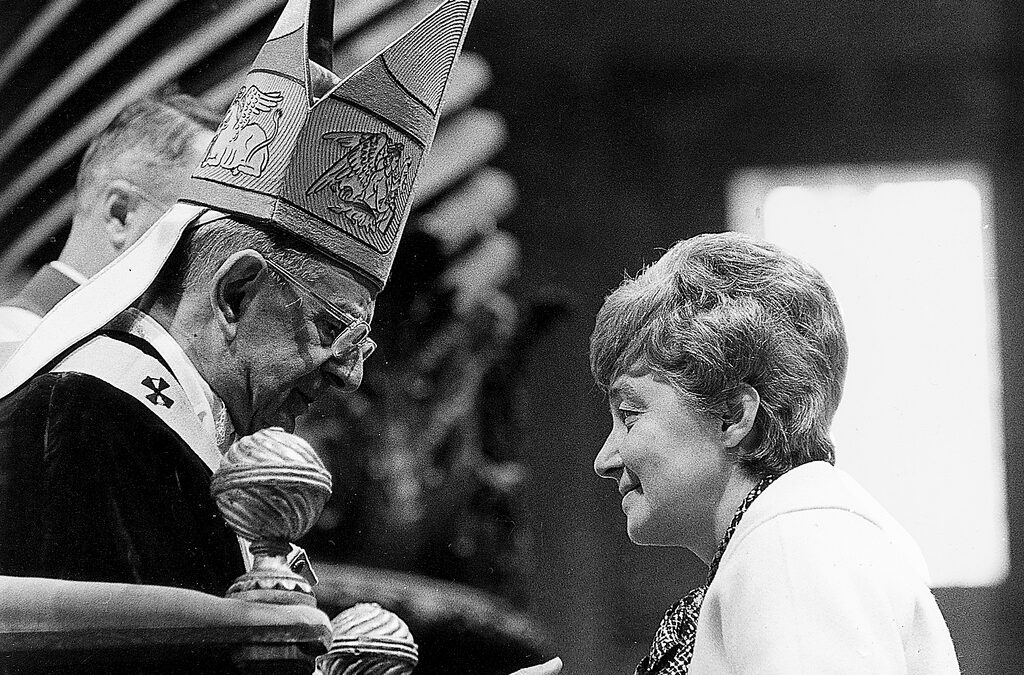
Oct 14, 2018 | Focolare Worldwide
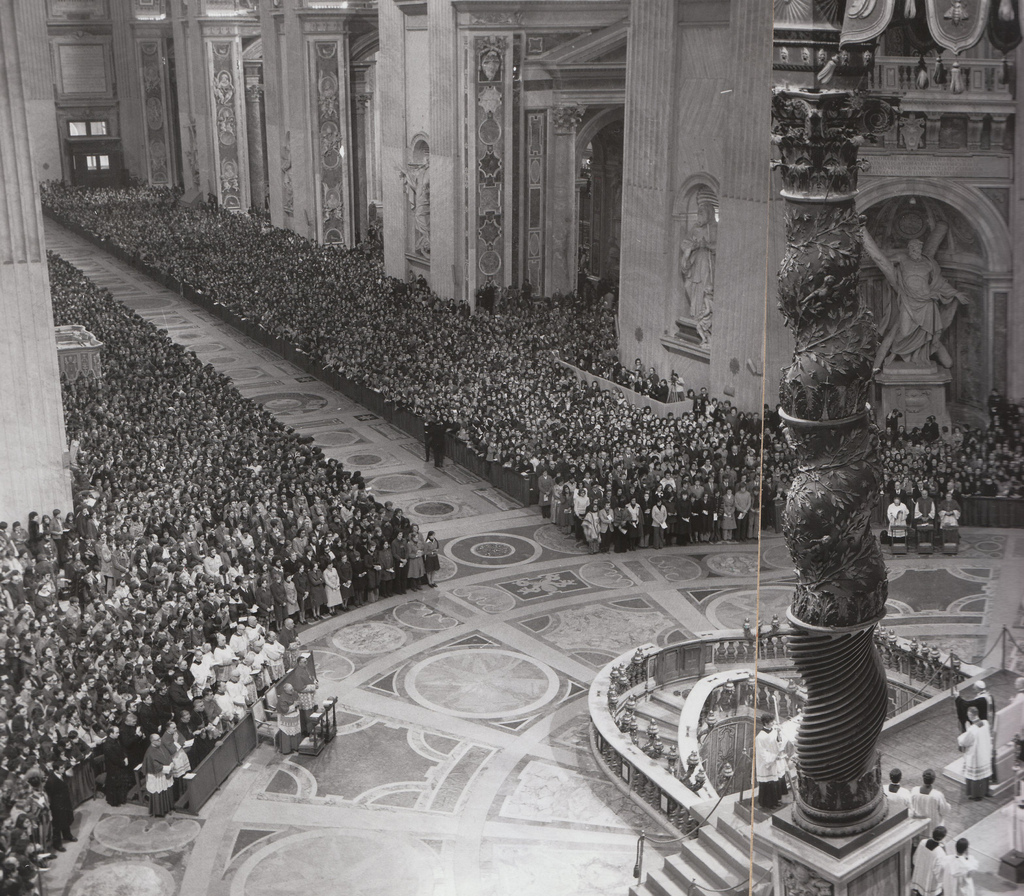 “YOUNG GEN! We welcome you with great joy as sons and daughters, brothers and sisters, friends! […] To search is really part of being a young person. Once the eyes of consciousness have opened on the world around us, curiosity is aroused in the souls of young people: they want to know, they want to try above anything else, and they want to attempt. Search, but for what? […] You, the young people of our times, you already have a negative answer, an almost rebellious answer in your hearts: we don’t want, you say, a world that presents itself to use like this! It’s a strange phenomenon: a world that offers you the most beautiful, the most perfect, the most enjoyable fruits of contemporary civilisation, doesn’t satisfy you, doesn’t please you. You benefit from the achievements, the comforts, the wonders placed at your disposal by modern progress. Yet a sense of criticism, protest and even nausea stops your search in this direction. This is a direction that takes you out of yourselves, an alienation because at the basis, it is a materialistic, hedonistic and selfish direction. It does not fully satisfy the soul. It does not completely resolve the important and personal problems of life. […] You have made a different choice. This is why you are called Gen, new generation. It is before all else a liberating choice, liberating from the passive conformism that affects so many young people of our times… At the basis of your psychology is a personal and sovereign act of free determination. The choice of Christ. […] Jesus Christ has crossed your path; and this is why you are here. Yes, the meeting with Him, Jesus Christ. But who is Jesus Christ? What an infinite question! […] Well: first, in Himself, Christ is the word of God made man; Christ is for us the Saviour of humanity. Two oceans: the Jesus Christ’s divinity, and Jesus Christ’s mission in the world. […] It seems to us that you, Focolarini, have faced this dual problem: Who is He, Christ? And Who is He, Christ, for us? And now the fire of light, enthusiasm, action, the gift of self and joy has been lit within you, and with a newfound inner fullness you have understood everything, God, yourselves, your life, people, our times, the central direction to take for the whole of your existence. Yes, this is the solution, this is the key, this is the formula, ancient and eternal, and when it is discovered, new. You have intuited it, and you have, rightfully, given your movement the definition of ‘New Generation’, Gen!
“YOUNG GEN! We welcome you with great joy as sons and daughters, brothers and sisters, friends! […] To search is really part of being a young person. Once the eyes of consciousness have opened on the world around us, curiosity is aroused in the souls of young people: they want to know, they want to try above anything else, and they want to attempt. Search, but for what? […] You, the young people of our times, you already have a negative answer, an almost rebellious answer in your hearts: we don’t want, you say, a world that presents itself to use like this! It’s a strange phenomenon: a world that offers you the most beautiful, the most perfect, the most enjoyable fruits of contemporary civilisation, doesn’t satisfy you, doesn’t please you. You benefit from the achievements, the comforts, the wonders placed at your disposal by modern progress. Yet a sense of criticism, protest and even nausea stops your search in this direction. This is a direction that takes you out of yourselves, an alienation because at the basis, it is a materialistic, hedonistic and selfish direction. It does not fully satisfy the soul. It does not completely resolve the important and personal problems of life. […] You have made a different choice. This is why you are called Gen, new generation. It is before all else a liberating choice, liberating from the passive conformism that affects so many young people of our times… At the basis of your psychology is a personal and sovereign act of free determination. The choice of Christ. […] Jesus Christ has crossed your path; and this is why you are here. Yes, the meeting with Him, Jesus Christ. But who is Jesus Christ? What an infinite question! […] Well: first, in Himself, Christ is the word of God made man; Christ is for us the Saviour of humanity. Two oceans: the Jesus Christ’s divinity, and Jesus Christ’s mission in the world. […] It seems to us that you, Focolarini, have faced this dual problem: Who is He, Christ? And Who is He, Christ, for us? And now the fire of light, enthusiasm, action, the gift of self and joy has been lit within you, and with a newfound inner fullness you have understood everything, God, yourselves, your life, people, our times, the central direction to take for the whole of your existence. Yes, this is the solution, this is the key, this is the formula, ancient and eternal, and when it is discovered, new. You have intuited it, and you have, rightfully, given your movement the definition of ‘New Generation’, Gen! 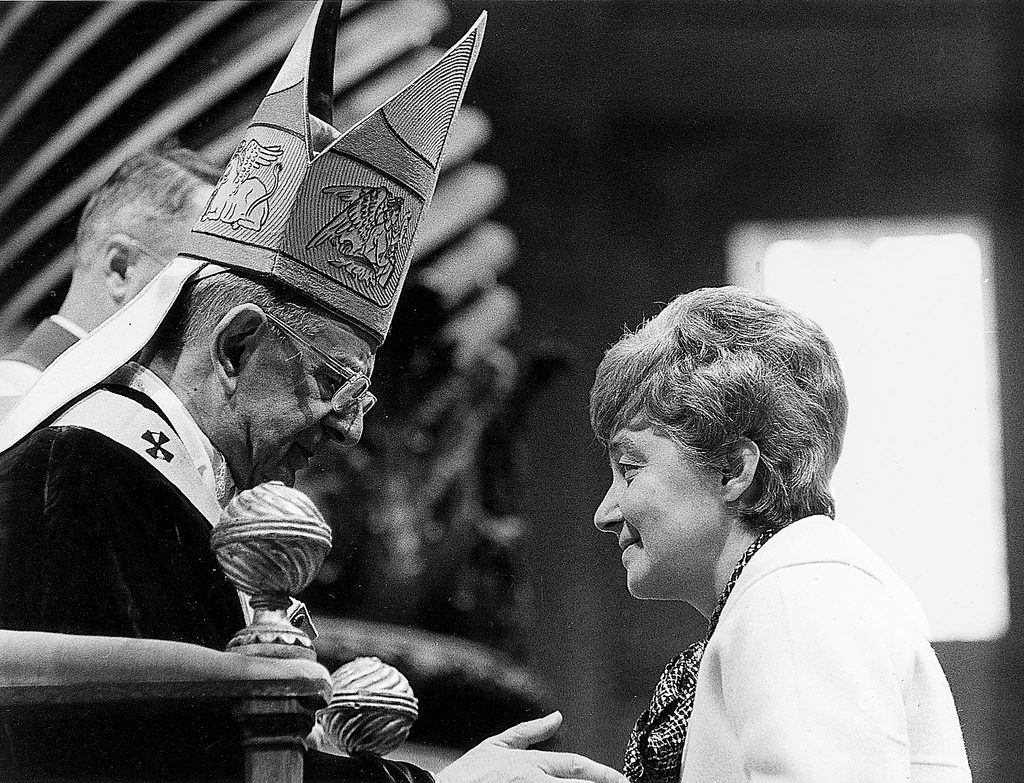 So, dear Young Gen! Encounter, know, love, follow Jesus Christ! This is your program. This is the synthesis of your spirituality which you, by celebrating the Jubilee of the Holy Year, wish to reaffirm in your consciences and translate into life. With two conclusions. The first, in order to condense the secret of your Movement in a central and mature thought try always to have Jesus as Teacher. And then the second conclusion, that we likewise listen to the words spoken by Jesus the Teacher: ‘You are all brothers and sisters’. Have the wisdom and courage to reach this conclusion which is the root of Christian social teaching. It is often disconcerting to observe how many claiming to be those who follow the Gospel are incapable of deducing from the Gospel itself a social teaching based on love. […] You, the new Generation, are faithful and coherent. If you have chosen Christ as your Master, have faith in Him and in the Church which leads and presents Him to you. Demonstrate with actions the realizing force of charity and social love, established by the Master. It will be an experience, yes, a new one, one which generates a better and more just world. It will be a strong experience; demanding resistance, sacrifice, maybe even heroism; it will demand that you too are the robust and willing Cyrenians who offer their own backs to support the Cross of Jesus. Yes, you should also suffer with Him, as Him, for Him! But do not be afraid, Gen! Be sure! You will have operated your salvation and that of our modern world. And just as you are today, you will always be good and happy!”
So, dear Young Gen! Encounter, know, love, follow Jesus Christ! This is your program. This is the synthesis of your spirituality which you, by celebrating the Jubilee of the Holy Year, wish to reaffirm in your consciences and translate into life. With two conclusions. The first, in order to condense the secret of your Movement in a central and mature thought try always to have Jesus as Teacher. And then the second conclusion, that we likewise listen to the words spoken by Jesus the Teacher: ‘You are all brothers and sisters’. Have the wisdom and courage to reach this conclusion which is the root of Christian social teaching. It is often disconcerting to observe how many claiming to be those who follow the Gospel are incapable of deducing from the Gospel itself a social teaching based on love. […] You, the new Generation, are faithful and coherent. If you have chosen Christ as your Master, have faith in Him and in the Church which leads and presents Him to you. Demonstrate with actions the realizing force of charity and social love, established by the Master. It will be an experience, yes, a new one, one which generates a better and more just world. It will be a strong experience; demanding resistance, sacrifice, maybe even heroism; it will demand that you too are the robust and willing Cyrenians who offer their own backs to support the Cross of Jesus. Yes, you should also suffer with Him, as Him, for Him! But do not be afraid, Gen! Be sure! You will have operated your salvation and that of our modern world. And just as you are today, you will always be good and happy!”
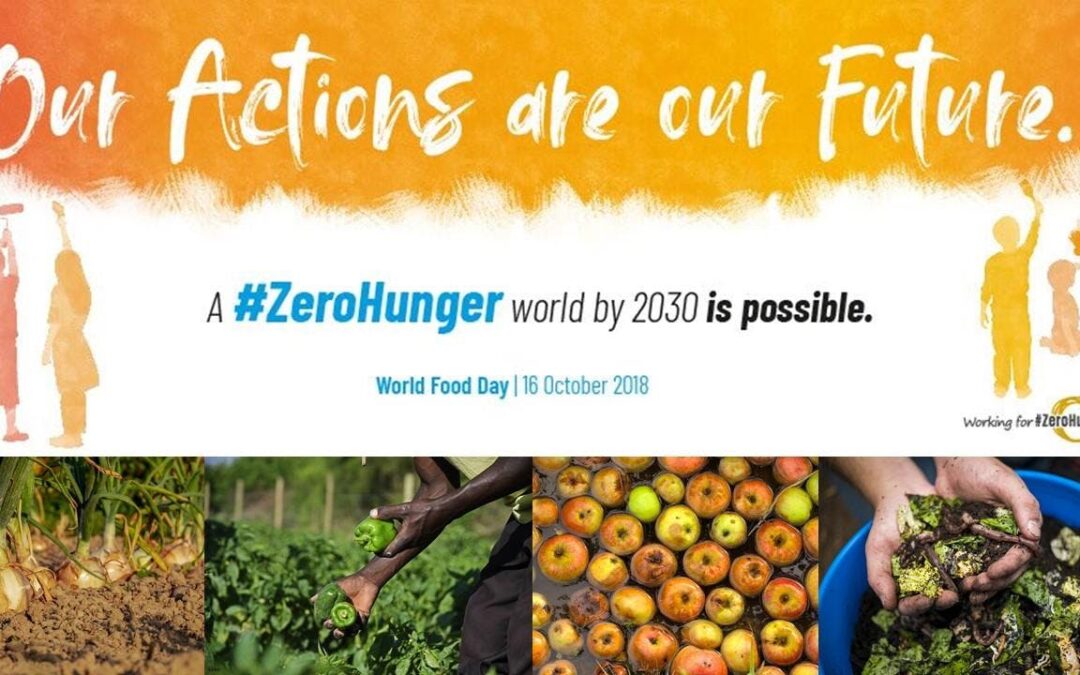
Oct 14, 2018 | Non categorizzato
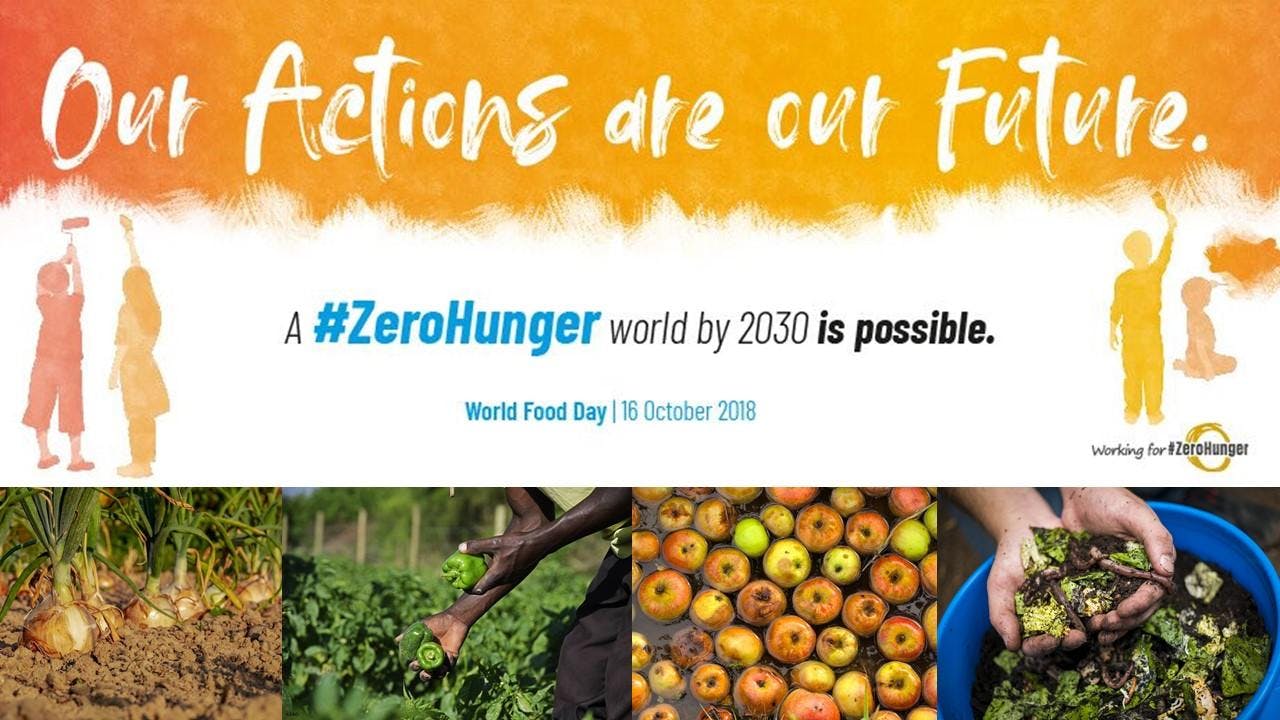 The theme of this year’s World Food Day is “Our actions are our future.” The event is held every year on October 16 by the Food and Agriculture Organisation (FAO). The day involves international organisations along with civil institutes, schools, businesses, media, research organisations and institutions in a rich program of events and public demonstrations to sensitize public opinion on topics such as poverty, hunger and malnutrition in favour of arriving at Zero Hunger, which is included among the objectives for the United Nations 2030 agenda. The teenagers of the Focolare Movement included it as one of the central points of their training and action during the whole year. Last June, a delegation of teenagers took part in a discussion at the International Headquarters of the FAO of Rome, Italy and received a “Zero Hunger Citizen” passport. The held projects around the world to raise awareness among peers and adults and dedicated the 2/2018 edition of the bi-monthly magazine “Teens” (Citta Nuova).
The theme of this year’s World Food Day is “Our actions are our future.” The event is held every year on October 16 by the Food and Agriculture Organisation (FAO). The day involves international organisations along with civil institutes, schools, businesses, media, research organisations and institutions in a rich program of events and public demonstrations to sensitize public opinion on topics such as poverty, hunger and malnutrition in favour of arriving at Zero Hunger, which is included among the objectives for the United Nations 2030 agenda. The teenagers of the Focolare Movement included it as one of the central points of their training and action during the whole year. Last June, a delegation of teenagers took part in a discussion at the International Headquarters of the FAO of Rome, Italy and received a “Zero Hunger Citizen” passport. The held projects around the world to raise awareness among peers and adults and dedicated the 2/2018 edition of the bi-monthly magazine “Teens” (Citta Nuova).
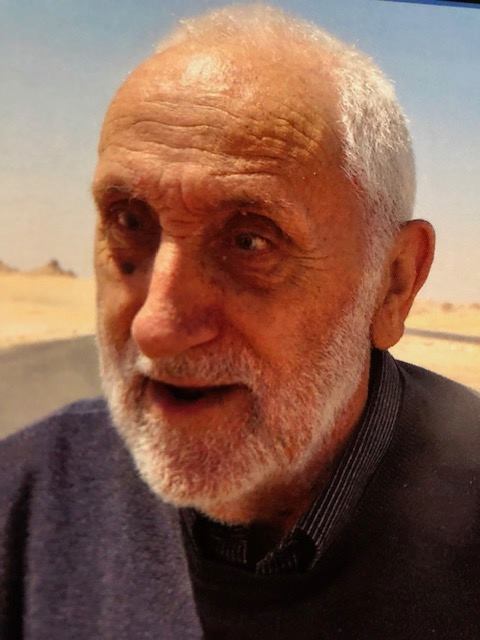
Oct 14, 2018 | Non categorizzato
 On 13 October, Ruggero Badano, father of Chiara Luce passed away at the age of 83. A good man with a simple and strong faith, together with his wife, Maria Teresa, he had witnessed the extraordinary human and spiritual experience which had led their daughter to be declared “Blessed” on 25 September 2010. “I thank Jesus for having sent you in our midst in this Journey which shall never end,” she had written on her 18th birthday. The Focolare Movement conveys its solidarity with Maria Teresa, the members of the Chiara Badano Foundation and all the friends of Blessed Chiara Badano, with immense gratitude for Ruggero’s exemplary life. For info: www.chiarabadano.org
On 13 October, Ruggero Badano, father of Chiara Luce passed away at the age of 83. A good man with a simple and strong faith, together with his wife, Maria Teresa, he had witnessed the extraordinary human and spiritual experience which had led their daughter to be declared “Blessed” on 25 September 2010. “I thank Jesus for having sent you in our midst in this Journey which shall never end,” she had written on her 18th birthday. The Focolare Movement conveys its solidarity with Maria Teresa, the members of the Chiara Badano Foundation and all the friends of Blessed Chiara Badano, with immense gratitude for Ruggero’s exemplary life. For info: www.chiarabadano.org
Oct 12, 2018 | Non categorizzato
Women can symbolize today’s civilization. In magazines and movie screens, in advertising and art, they reign like queens. Yet it is easy to see their royalty as artificial: divas who hold court today are forgotten tomorrow. In contrast, from this perspective the biographies of Christianity’s greatest female saints and their teachings once again become current. Teresa, the reformer of Carmel during the Protestant revolution, under the suspicious gaze of the kings and lords of Spain, faced with the threat of the Inquisition in her country, achieved her freedom through poverty. It is the unique freedom of God’s children. She remade her existence into an eminent adventure to overcome human with divine. She brought beauty, the poetry of holiness, back to the center of our individual and social existence. At the time there was a form of self-righteousness that you might just as well have called misogyny. Catherine of Siena had already suffered it and had been silenced because she was a woman – she who never stopped urging men, including the high and mighty, to not behave like little girls. St. Teresa gave herself entirely to God and inspired other women to do so. The obsession of our modern days lies in a continuous, frenetic demand for recognition and riches. Teresa taught us to free ourselves from this slavery and recover our serenity and peace. In her writings she explains her reasons with evidence, a light that enchants souls – even those of men today who are in the clutches of business. She is a strong woman who speaks only to serve God with energy and perseverance. She knew of the influence that a woman consecrated to God can have on society. Her life and writings demonstrate the essence of the Gospel revolution, in our hearts and in the people, uncovering yet again the essentials of love that, through our neighbors, opens access to God. It puts God in the spirit, in the law, in institutions, in customs. Teresa, with the grace of a mother and teacher, taught to speak continuously with God, a conversation that everyone can carry out within the temple of their souls, even while on the road, even surrounded by noise. I believe that day after day the number of women and men who are guided by Teresa’s wisdom will increase. They will rediscover their reason for being, going back with her to the source. Action will blossom more and more from contemplation. Yet here – we could say with the saint – Martha and Mary almost always align, since the interior works on the exterior … When exterior works come from these roots, there are admirable, sweetly scented flowers that blossom from the tree of divine love. Teresa was a courageous astronaut of the divine, as well as also a practical woman who knew the world. And because she knew the world, she stood out in heaven. If her teachings were to expand even to our own homes, unions, politics, factories and the world, it would become a sort of Carmel, where Teresa took on the feminine royalty of she who was blessed among women. Igino Giordani, Fides, n.7–12, 1962, pp.185–187.
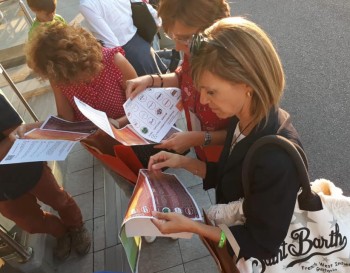
Oct 11, 2018 | Focolare Worldwide
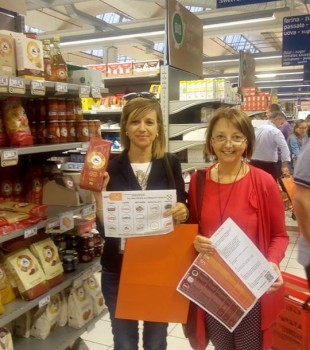 Put the heads of a group of teenagers together having taken part in the recent annual workshop in Loppiano, and one keyword emerges: “participation.” In view of this, the Youth Section of the Economy of Communion (EoC) launched on the social network and among their friends a workshop called “Inside the LABel.” At the conclusion of the day which the Bonfanti Industrial Park had dedicated to the topics of economy and work, the participants left the meeting hall and the filled cars that were waiting to take them to the nearby Coop Supermarket in the town of Figline. A table was set up at the entrance of the superstore along with ballot boxes. Then, an innovative experiment began that lasted for two hours, a genuine voting campaign. The five candidates were: pasta, coffee, chocolate, canned tuna and oranges. “But what does democracy have to do with a supermarket?” someone asked. “It does, it has a lot to do…” said one of the organizers named Chiara. “Using our wallets, we exert our “buying power.” The “vote with our wallet” is just one example of civil responsibility. Whenever we buy a product we express a preference, we support the work of a business that produces the product, a particular business model, a mission, a series of internal processes, a certain type of managing of relationships with employees and providers, a certain type of impact on the environment.” “After a meeting with Luigino Buni on the relationship between democracy and market,” says Stefania, “we worked for nearly three months examining the ‘vision’ and ‘mission’ of small and large brands at around 20 businesses. Following indicators such as transparency, production chain, respect for the environment, social responsibility, corporate form and legal record, we gathered data and information that were published on the web.”
Put the heads of a group of teenagers together having taken part in the recent annual workshop in Loppiano, and one keyword emerges: “participation.” In view of this, the Youth Section of the Economy of Communion (EoC) launched on the social network and among their friends a workshop called “Inside the LABel.” At the conclusion of the day which the Bonfanti Industrial Park had dedicated to the topics of economy and work, the participants left the meeting hall and the filled cars that were waiting to take them to the nearby Coop Supermarket in the town of Figline. A table was set up at the entrance of the superstore along with ballot boxes. Then, an innovative experiment began that lasted for two hours, a genuine voting campaign. The five candidates were: pasta, coffee, chocolate, canned tuna and oranges. “But what does democracy have to do with a supermarket?” someone asked. “It does, it has a lot to do…” said one of the organizers named Chiara. “Using our wallets, we exert our “buying power.” The “vote with our wallet” is just one example of civil responsibility. Whenever we buy a product we express a preference, we support the work of a business that produces the product, a particular business model, a mission, a series of internal processes, a certain type of managing of relationships with employees and providers, a certain type of impact on the environment.” “After a meeting with Luigino Buni on the relationship between democracy and market,” says Stefania, “we worked for nearly three months examining the ‘vision’ and ‘mission’ of small and large brands at around 20 businesses. Following indicators such as transparency, production chain, respect for the environment, social responsibility, corporate form and legal record, we gathered data and information that were published on the web.” 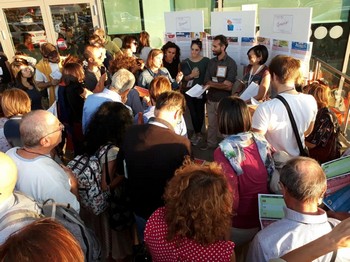 “It was an interesting and enriching challenge,” continues Francesca, “which revealed a complexity of ethics, values and conventions that influence our daily purchases. As we moved ahead and our awareness increased, we came up with a project that we could share. The role of civil responsibility, being critical consumers and becoming aware that one’s own purchases, can influence the behaviour of large and small businesses. This is why we came up with a project that we call “Inside the Label.” This year’s LoppianoLab seemed like the opportunity to present it.” Andrea interrupts: “Based on the materials that were collected, we chose three products from different brands for each category, trying to highlight the nuances in terms of transparency, pricing, commitment and quality. We left it to the participants to choose the products they would buy, after having shared with them the tools for reading the labels also for “moral calories” and “ethical sugars.” It was a project that took nothing for granted, but stuck to reality.
“It was an interesting and enriching challenge,” continues Francesca, “which revealed a complexity of ethics, values and conventions that influence our daily purchases. As we moved ahead and our awareness increased, we came up with a project that we could share. The role of civil responsibility, being critical consumers and becoming aware that one’s own purchases, can influence the behaviour of large and small businesses. This is why we came up with a project that we call “Inside the Label.” This year’s LoppianoLab seemed like the opportunity to present it.” Andrea interrupts: “Based on the materials that were collected, we chose three products from different brands for each category, trying to highlight the nuances in terms of transparency, pricing, commitment and quality. We left it to the participants to choose the products they would buy, after having shared with them the tools for reading the labels also for “moral calories” and “ethical sugars.” It was a project that took nothing for granted, but stuck to reality.  Like every respectable voting campaign, the votes are anticipated by a talk show prepared and broadcast by the organizers at the entrance of the Coop. Each of them presents his or her own candidate, along with comments from a citizen-consumer. Then, the participants are provided with a shopping sack, a voting card and the addresses of a web site which was created for the occasion. The aisles of the Co-op, with its usual Saturday family shoppers, were also filled with shoppers who were carefully re-reading labels. After paying the cashier, the final democratic duty of political responsibility was to mark an “X” beside the products one had chosen and to drop it into the ballot box. Then there were interviews, photos, surveys and data collection. There were more than a hundred voters, but far many more things to think about. In the meantime, the Italian Constituent of the EoC is already planning a second “Inside the LABel” event at Castel Gandolfo, Italy, on the occasion of the International Prophetic Economy Event (November 2-4). Deep down, we’re all change-makers. Source: EdC online
Like every respectable voting campaign, the votes are anticipated by a talk show prepared and broadcast by the organizers at the entrance of the Coop. Each of them presents his or her own candidate, along with comments from a citizen-consumer. Then, the participants are provided with a shopping sack, a voting card and the addresses of a web site which was created for the occasion. The aisles of the Co-op, with its usual Saturday family shoppers, were also filled with shoppers who were carefully re-reading labels. After paying the cashier, the final democratic duty of political responsibility was to mark an “X” beside the products one had chosen and to drop it into the ballot box. Then there were interviews, photos, surveys and data collection. There were more than a hundred voters, but far many more things to think about. In the meantime, the Italian Constituent of the EoC is already planning a second “Inside the LABel” event at Castel Gandolfo, Italy, on the occasion of the International Prophetic Economy Event (November 2-4). Deep down, we’re all change-makers. Source: EdC online
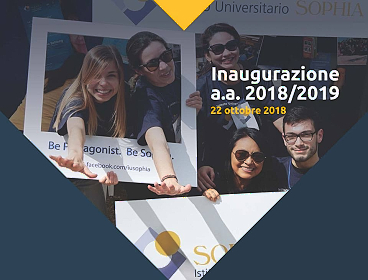
Oct 11, 2018 | Focolare Worldwide
 Sophia University Institute of Loppiano will celebrate the opening of the 11th academic year on October 22, 2018, at 17:00 in the Auditorium. Following the greetings from the Grand Chancellor, Cardinal Giuseppe Betori, Archbishop of Florence, Italy; Vice-Grand Chancellor Dr Maria Voce, president of the Work of Mary; and Dr Egidio Sgulloni, president of the Foundation for Sophia, there will be a panel discussion “On the net: Sophia and the University of Perugia,” with interventions by Dr Piero Coda, president of Sophia University Institute, Dr Franco Moriconi, Grand Rector of the Universty of Perugia Studies, and of Dr Mary Elisabeth Trini, double graduate with a double title IU Sophia-University of Perugia. It will conclude with a roundtable titled “The Challenge of Fraternity In Politics and Law,” with a presentation by the “Sophia Center for Researcih on Politics and Human Rights.” Professors Antonio Maria Baggio (IUS), Adriana Cosseddu (University of Sassari) and Antonio Marques Prieto (University of Malaga) will also make presentations.
Sophia University Institute of Loppiano will celebrate the opening of the 11th academic year on October 22, 2018, at 17:00 in the Auditorium. Following the greetings from the Grand Chancellor, Cardinal Giuseppe Betori, Archbishop of Florence, Italy; Vice-Grand Chancellor Dr Maria Voce, president of the Work of Mary; and Dr Egidio Sgulloni, president of the Foundation for Sophia, there will be a panel discussion “On the net: Sophia and the University of Perugia,” with interventions by Dr Piero Coda, president of Sophia University Institute, Dr Franco Moriconi, Grand Rector of the Universty of Perugia Studies, and of Dr Mary Elisabeth Trini, double graduate with a double title IU Sophia-University of Perugia. It will conclude with a roundtable titled “The Challenge of Fraternity In Politics and Law,” with a presentation by the “Sophia Center for Researcih on Politics and Human Rights.” Professors Antonio Maria Baggio (IUS), Adriana Cosseddu (University of Sassari) and Antonio Marques Prieto (University of Malaga) will also make presentations.

 Rome: Partecipation in the event “Quando la Carità ti chiama”, (When Charity calls you), promoted by the Vincentian Family as part of the “Finding Vince 400” (FV400), International Film Festival. Auditorium Conciliazione. GenVerde Tours
Rome: Partecipation in the event “Quando la Carità ti chiama”, (When Charity calls you), promoted by the Vincentian Family as part of the “Finding Vince 400” (FV400), International Film Festival. Auditorium Conciliazione. GenVerde Tours



 Many of our readers are familiar with the story of Margarita Ramirez De Moreno who comes from Santa Maria di Catamarca in the north east of Argentina. She is a descendent of Calchaquies Aborigines whose leader was Juan Calchaqui. These people were well known for their abilities in many forms of traditional crafts. Margarita certainly inherited an enterprising spirit and great talent in weaving from her ancestors. When she was young, she studied for a diploma at the “Aurora School” in her town: this institute is recognised by the Argentinian government for the outstanding contribution it makes to teaching about designs and traditional skills deriving from the “quechuan” culture. Later on in life, Margarita was unemployed but she did not give in to the personal challenges that she and many women like her faced but decided to open a spinning mill to provide thread for the looms in the school workshop. This enabled her to overcome discrimination and reclaim her cultural identity. On October 1st in Tucuman, Margarita received an award during the first international meeting of “Women for Peace” organised by the “World Federation of Grand Master Ladies”. This is an international association, found in many parts of the world that works with individuals, groups and foundations: its spirit facilitates women in establishing links of friendship, fraternity and support and enables them engage politically in initiatives promoting peace, security and protection.
Many of our readers are familiar with the story of Margarita Ramirez De Moreno who comes from Santa Maria di Catamarca in the north east of Argentina. She is a descendent of Calchaquies Aborigines whose leader was Juan Calchaqui. These people were well known for their abilities in many forms of traditional crafts. Margarita certainly inherited an enterprising spirit and great talent in weaving from her ancestors. When she was young, she studied for a diploma at the “Aurora School” in her town: this institute is recognised by the Argentinian government for the outstanding contribution it makes to teaching about designs and traditional skills deriving from the “quechuan” culture. Later on in life, Margarita was unemployed but she did not give in to the personal challenges that she and many women like her faced but decided to open a spinning mill to provide thread for the looms in the school workshop. This enabled her to overcome discrimination and reclaim her cultural identity. On October 1st in Tucuman, Margarita received an award during the first international meeting of “Women for Peace” organised by the “World Federation of Grand Master Ladies”. This is an international association, found in many parts of the world that works with individuals, groups and foundations: its spirit facilitates women in establishing links of friendship, fraternity and support and enables them engage politically in initiatives promoting peace, security and protection.  “There is no peace without justice and there is no justice without peace,” affirmed Mariela Martin Domenichelli, the co ordinator of the Latin American branch of the federation. “It’s important to listen to the women describing the situations in which they live so they can transform their ideas into political action that benefits the entire community.” The meeting wanted to showcase the positive contribution made by women in various fields of action. After the federation visited her area, Margarita was chosen as the person who symbolises the complete integration of women and the entire Aboriginal community to which they belong. Margarita – who now has seven children – said that it had not been easy to convince women in her area to work in spinning mills once again because they had suffered discrimination for so long. In addition, they had to walk long distances, crossing rivers to reach the mill because there was no transport. However, they gradually began to share the little they had: a bobbin, some wool or their skills in traditional crafts.
“There is no peace without justice and there is no justice without peace,” affirmed Mariela Martin Domenichelli, the co ordinator of the Latin American branch of the federation. “It’s important to listen to the women describing the situations in which they live so they can transform their ideas into political action that benefits the entire community.” The meeting wanted to showcase the positive contribution made by women in various fields of action. After the federation visited her area, Margarita was chosen as the person who symbolises the complete integration of women and the entire Aboriginal community to which they belong. Margarita – who now has seven children – said that it had not been easy to convince women in her area to work in spinning mills once again because they had suffered discrimination for so long. In addition, they had to walk long distances, crossing rivers to reach the mill because there was no transport. However, they gradually began to share the little they had: a bobbin, some wool or their skills in traditional crafts. 








 Put the heads of a group of teenagers together having taken part in the recent annual workshop in Loppiano, and one keyword emerges: “participation.” In view of this, the Youth Section of the Economy of Communion (EoC) launched on the social network and among their friends a workshop called “Inside the LABel.” At the conclusion of the day which the Bonfanti Industrial Park had dedicated to the topics of economy and work, the participants left the meeting hall and the filled cars that were waiting to take them to the nearby Coop Supermarket in the town of Figline. A table was set up at the entrance of the superstore along with ballot boxes. Then, an innovative experiment began that lasted for two hours, a genuine voting campaign. The five candidates were: pasta, coffee, chocolate, canned tuna and oranges. “But what does democracy have to do with a supermarket?” someone asked. “It does, it has a lot to do…” said one of the organizers named Chiara. “Using our wallets, we exert our “buying power.” The “vote with our wallet” is just one example of civil responsibility. Whenever we buy a product we express a preference, we support the work of a business that produces the product, a particular business model, a mission, a series of internal processes, a certain type of managing of relationships with employees and providers, a certain type of impact on the environment.” “After a meeting with Luigino Buni on the relationship between democracy and market,” says Stefania, “we worked for nearly three months examining the ‘vision’ and ‘mission’ of small and large brands at around 20 businesses. Following indicators such as transparency, production chain, respect for the environment, social responsibility, corporate form and legal record, we gathered data and information that were published on the web.”
Put the heads of a group of teenagers together having taken part in the recent annual workshop in Loppiano, and one keyword emerges: “participation.” In view of this, the Youth Section of the Economy of Communion (EoC) launched on the social network and among their friends a workshop called “Inside the LABel.” At the conclusion of the day which the Bonfanti Industrial Park had dedicated to the topics of economy and work, the participants left the meeting hall and the filled cars that were waiting to take them to the nearby Coop Supermarket in the town of Figline. A table was set up at the entrance of the superstore along with ballot boxes. Then, an innovative experiment began that lasted for two hours, a genuine voting campaign. The five candidates were: pasta, coffee, chocolate, canned tuna and oranges. “But what does democracy have to do with a supermarket?” someone asked. “It does, it has a lot to do…” said one of the organizers named Chiara. “Using our wallets, we exert our “buying power.” The “vote with our wallet” is just one example of civil responsibility. Whenever we buy a product we express a preference, we support the work of a business that produces the product, a particular business model, a mission, a series of internal processes, a certain type of managing of relationships with employees and providers, a certain type of impact on the environment.” “After a meeting with Luigino Buni on the relationship between democracy and market,” says Stefania, “we worked for nearly three months examining the ‘vision’ and ‘mission’ of small and large brands at around 20 businesses. Following indicators such as transparency, production chain, respect for the environment, social responsibility, corporate form and legal record, we gathered data and information that were published on the web.”  “It was an interesting and enriching challenge,” continues Francesca, “which revealed a complexity of ethics, values and conventions that influence our daily purchases. As we moved ahead and our awareness increased, we came up with a project that we could share. The role of civil responsibility, being critical consumers and becoming aware that one’s own purchases, can influence the behaviour of large and small businesses. This is why we came up with a project that we call “Inside the Label.” This year’s LoppianoLab seemed like the opportunity to present it.” Andrea interrupts: “Based on the materials that were collected, we chose three products from different brands for each category, trying to highlight the nuances in terms of transparency, pricing, commitment and quality. We left it to the participants to choose the products they would buy, after having shared with them the tools for reading the labels also for “moral calories” and “ethical sugars.” It was a project that took nothing for granted, but stuck to reality.
“It was an interesting and enriching challenge,” continues Francesca, “which revealed a complexity of ethics, values and conventions that influence our daily purchases. As we moved ahead and our awareness increased, we came up with a project that we could share. The role of civil responsibility, being critical consumers and becoming aware that one’s own purchases, can influence the behaviour of large and small businesses. This is why we came up with a project that we call “Inside the Label.” This year’s LoppianoLab seemed like the opportunity to present it.” Andrea interrupts: “Based on the materials that were collected, we chose three products from different brands for each category, trying to highlight the nuances in terms of transparency, pricing, commitment and quality. We left it to the participants to choose the products they would buy, after having shared with them the tools for reading the labels also for “moral calories” and “ethical sugars.” It was a project that took nothing for granted, but stuck to reality. 